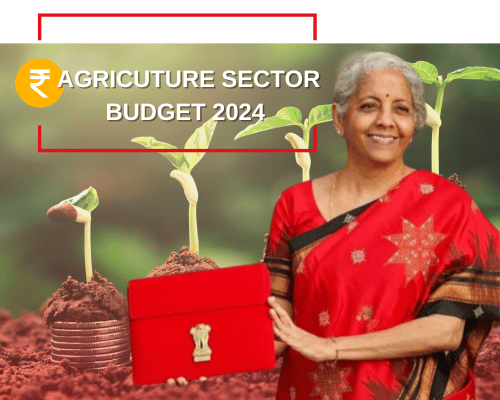Finance Minister Nirmala Sitharaman allocated ₹1.52 lakh crore for agriculture and allied sectors in the 2024-25 budget to bolster India’s agricultural sector. This underscores the government’s commitment to enhancing agricultural productivity, sustainability, and farmer welfare.
Climate-Resilient Crops
The standout feature of this year’s agriculture budget is the introduction of 109 new high-yielding and climate-resilient varieties of 32 field and horticulture crops. This aims to address climate change challenges and ensure sustainable crop production despite unpredictable weather.
ALSO READ – Union Budget 2024: Clean Energy and Sustainability
“Government to review agricultural research and focus on developing climate-resilient varieties,” Sitharaman stated, stressing the importance of adapting to changing environmental conditions.
The Finance Minister announced a plan to initiate 10 million farmers into natural farming over the next two years. This shift towards eco-friendly farming is expected to reduce dependence on chemical fertilizers and pesticides, promoting soil health and sustainable agriculture.
To support this transition, the government plans to establish 10,000 need-based bio-input centers across the country. These centers will provide farmers with organic fertilizers, pesticides, and other eco-friendly inputs for natural farming.Recognizing the need to reduce India’s dependence on imported pulses and edible oils, the budget outlines plans to enhance the storage and marketing ecosystem for these crops. This initiative is expected to boost domestic production and contribute to self-sufficiency in these food items.
Digital Infrastructure
To modernize agriculture, Sitharaman announced a digital public infrastructure for agriculture with state governments. The initiative aims to integrate 6 crore farmers and their land into a digital registry, providing access to vital information like weather forecasts, crop advisory services, and market prices.
“Digital crop survey for Kharif to be conducted in 400 districts in FY25,” the Finance Minister said, highlighting the government’s commitment to using technology for agricultural advancement.
The budget supports more than just crop farming. It includes provisions for financing shrimp farming, processing, and export through NABARD (National Bank for Agriculture and Rural Development). “Financing for shrimp farming, processing, and export to be facilitated through NABARD,” Sitharaman stated, signaling support for the aquaculture sector.
To improve farmers’ access to credit, the Finance Minister announced that the issuance of Jan Samarth-based Kisan Credit Cards will be enabled in five states. This move is expected to streamline the process of obtaining agricultural loans for farmers in these regions.
To fast-track rural economic growth and create jobs, Sitharaman announced a National Cooperation Policy. This policy will strengthen cooperative societies and boost rural economic development.
While the budget presents a positive outlook for the agricultural sector, several challenges remain, including water scarcity, small landholdings, and ensuring fair prices for farm produce. The success of these initiatives will depend on effective implementation and the ability to address these ongoing concerns.
Follow Climate India for more Environmental News. Connect with us on Facebook, Twitter, Instagram, and YouTube




